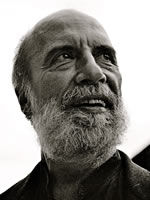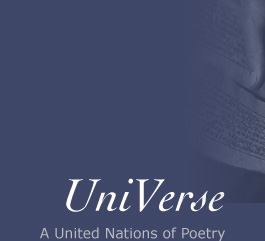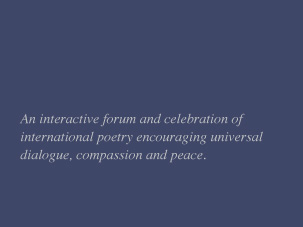| |
 |
 |
 |

Photo by Valerie Majere |
Raúl Zurita, winner of the Chilean National Poetry Prize, is arguably the most powerful poetic voice in Latin America today. His compelling rhythms combine epic and lyric tones, public and most intimate themes, grief and joy. Despite having been arrested and tortured under the Pinochet dictatorship, Zurita’s prevailing attitude in his Dantesque trilogy Purgatorio (Purgatory), Anteparaíso (Anteparadise), and La Vida Nueva (The New Life) is a deep love for everything and everybody in the world. His work is part of a revolution in poetic language that began in the 1970s and sought to find new forms of expression, radically different from those of Pablo Neruda. The challenge was to confront the contemporary epoch, with its particular forms of violence, including violence done to language. His book, INRI (Marick Press, 2009, translated by William Rowe), is distinctive in that it does not speak out of individual sorrow—though this is not missing—but seeks, rather, a new space, out of which love might be asserted as prime human reality, a space which might give birth to a different type of society. Purgatory, translated by Anna Deeny, was published by The University of California Press. Song for the Disappeared Love, translated by Daniel Borzutzky, was released in 2010 by Action Books. Zurita’s other poetry collections include: El paraíso está vacío, Canto a su amor desaparecido, El amor de chile, Los países muertos, Zurita / in memoriam, Las ciudades de agua. Zurita, his most recent work of over 700 pages, includes “Inscriptions Facing the Sea,” a project to inscribe 22 phrases in the cliffs of the north coast of Chile that would only be read from the sea.
Raul Zurita was born in Santiago, Chile, in 1950. He started out studying engineering before turning to poetry. His early work is a ferocious response to Augusto Pinochet’s 1973 military coup. Like many other Chileans, Zurita was arrested and tortured. When he was released, he helped to form a radical artistic group CADA, and he became renowned for his provocative and intensely physical public performances. He has written what are perhaps the most massively scaled poems ever created. He has done this with earth-moving equipment and with smoke-trailing aircraft. In the early 1980s, Zurita famously sky-wrote passages from his poem, “The New Life,” over New York and later—still during the reign of Pinochet—he bulldozed the phrase “Ni Pena Ni Miedo” (“Without Pain Or Fear”) into the Atacama Desert which, for its length, can only be seen from the sky.
An article in Jacket Magazine elucidates, “He says that in those days of brutality and distrust and terror…he began to imagine writing poems in the sky, on the faces of cliffs, in the desert…. He started to imagine that he might fight sadistic force with poems as insubstantial as contrails in the air over a city.” Zurita’s renowned poetic trilogy, composed over a span of 15 years, is considered one of the singular poetic achievements in Latin American poetry: Purgatory appeared in 1979, Anteparadise in 1982, and The New Life in 1993.
Zurita is the recipient of numerous awards, including a Guggenheim Fellowship, the Casa de las Americas Prize from Cuba and the National Poetry Prize of Chile. His work has been translated into a dozen languages.
Translations from Spanish by Anna Deeny. The Dreams for Kurosawa series are forthcoming in a bilingual edition from House Press, 2011.
|
 |
 |
Spanish version
Mi Nombre: Akira Kurosawa
Como una vergüenza que yo tenía comencé a
soñar. La laguna es amarillenta y detrás de los
paredones de sal se ve el océano. La playa se
llama Punta de Lobos y las salinas están al
lado. Recorremos la laguna en un bote guiados
por un remero descalzo y escucho el estallido
de las rompientes a menos de 50 metros.
Durante la dictadura el lugar se hizo conocido
porque Pinochet lo transformó en su sitio de
veraneo y hoy es un paraíso de surfistas. Las
salinas y la laguna ya no existen y las había
olvidado por completo, pero volví a recordarlas
cuando mi abuela murió: el botero remaba
frente a mí y a los lados se veían las paredes
de sal. Tengo cinco años, mi hermana tres y
estamos con mi abuela. Había nacido en Italia,
en Rapallo, y llegó a Chile con mi madre
todavía niña. Ambas quedaron viudas con dos
días de diferencia. Primero mi madre, luego mi
abuela. Fue un veraneo corto. Mi abuela murió
en 1986. Yo sobreviví a una dictadura, pero no a
la vergüenza. Años después, cuando me llegó a
mí el turno, su cara se me vino encima como una
montaña blanca de sal. Quise escribirlo, pero las
palabras, como vísceras humeantes, llegaron
muertas a mis dedos. Mi nombre: Akira Kurosawa.
English version
My Name: Akira Kurosawa
Like shame that possessed me then I began to
dream. The lagoon is yellowish and beyond the
massive salt walls that encircle it you can see
the ocean. The beach is called Punta de Lobos
and the salt mines are nearby. We cross the
lagoon in a boat led by a barefooted oarsman
and I hear the clamor of the breakers crashing
at least 50 meters away. During the dictatorship
the place became popular because Pinochet turned
it into his summer resort and now it’s a surfer’s
paradise. Neither the mines nor the lagoon exist
anymore and I’d forgotten them completely.
But some days following the death of my
grandmother I remembered them: the boatman
rowed in front of me and behind him you could
see the salt walls. I’m five years old, my sister
is three and we’re with my grandmother. Born
in Italy, in Rapallo, she arrived to Chile with my
mother still a child. Both were widowed two days
apart. First my mother, then my grandmother.
It was a short summer holiday. In 1986 my
grandmother died. I survived a dictatorship, but
not the shame. Many years later, when it was
my turn, her face came down upon me like a
white mountain of salt. I wanted to write it,
but the words, like smoldering entrails arrived
dead to my fingers. My name: Akira Kurosawa.
|
 |
 |
Spanish version
Sueño 19/ A Kurosawa
Ha llegado el fin. Los huecos blancos del horizonte
han comenzado a crecer y al despertar supe que yo
había estado antes en la cordillera. Me preparé
un café y me decidí a esperar. Tiempo atrás
vendí máquinas de escribir de la Olivetti y no
me sorprendió encontrarme con la cuadrilla de
ventas nuevamente. Éramos un grupo de doce y
Dezerega repartía los territorios. Era nuestro jefe.
El que muchos ya se hubieran muerto, incluido
Dezerega tampoco me llamó la atención. Terminé
mi café y recordé que trató de defenderme cuando
me echaron. La sala en que nos reuníamos por la
mañana era como una sala de clases, con unos
escritorios en fila y el de Dezerega al frente. Creo
que llegue a estimar a Dezerega, también a Luis
Cerda, el tipo me tapaba los atrasos y me esperaba
para meternos a un boliche a tomar café. Vi a Luis
Cerda hace poco. Había decenas de máquinas de
escribir arrumbadas en su cuarto, unas Lettera 32
de color gris. Me dijo que habían sobrado y que
no importaba porque ya nadie usa máquinas de
escribir. Hoy ya es tarde. La represión ha sido
feroz y han arrojado los cuerpos sobre el mar y
las montañas. Al levantarme observé que no podía
mover mis brazos encostrados bajo la nieve.
Kurosawa, le dije, yo era un simple vendedor
de máquinas de escribir y ahora estoy muerto y nieva.
English version
Dream 19/ For Kurosawa
The end has come. The white holes have begun to
extend themselves in the horizon and as I awake I
know that I’d been in the cordillera. I made coffee
and decided to wait. Some time ago I sold Olivetti
typewriters and it didn’t surprise me to come across
the sales team again. We were a group of twelve and
Dezerega assigned territories. He was our boss. The
fact that several had already died, including
Dezerega, didn’t surprise me either. I finished my
coffee and remembered how he tried to defend me
when they threw me out. The room where we met in
the mornings was like a classroom, with lined up
desks and Dezerega’s in the front. I think I ended up
respecting Dezerega, also Luis Cerda. When I was
late he covered for me and he’d hang around so we
could head to a bar for coffee. I saw Luis Cerda not
long ago. There were dozens of typewriters dumped
in his room, some grey Lettera 32s. He said they
were leftovers and that it didn’t matter because no
one uses typewriters anymore. Today is already too
late. The repression has been ferocious and they’ve
thrown the bodies over the sea and mountains. As I
got up I noticed I couldn’t move my arms frozen
beneath the snow. Kurosawa, I said, I was just a
typewriter salesman and now I’m dead and it snows.
|
 |
 |
|  |
|





